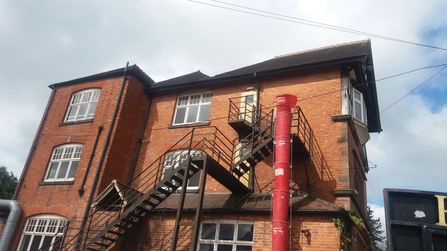The Act sets out to protect the nests of all birds but there are two caveats: first that a nest has to be active (eg with eggs or chicks in it) and second that the nest itself has to be ‘knowingly’ interfered with.
In February this year, the peregrines that have nested for many years on a tall mill building in Belper were disturbed by contractors working to empty the mill’s contents prior to redevelopment. All manner of items were thrown from upstairs windows close to the nest, scaring the birds away. However, because the birds had not laid eggs and because the nest itself wasn’t touched or ‘active’, the police were powerless to do anything about it. As a result there has been no nesting attempt there this summer.
Then, in June, three cases of disturbance to nesting swifts came to light.
In Derby a Georgian building which had swifts nesting in it had scaffolding put up and (apparently) all the holes below the eaves had been blocked up to keep the feral pigeons out. By May the upper scaffolding had been removed but from the ground it appeared that the swifts had been excluded. As it happened the owner was keen to help and allowed us to install nest boxes close to where the swifts had been nesting. On getting to the top of the scaffolding to decide where to put the boxes we were overjoyed to see swifts coming into their nests. By chance the tiny gaps right up under the eaves had not been blocked and the birds had been spared, albeit accidentally. (Nevertheless we installed two new nest boxes with the hope of increasing the birds’ numbers).
A week later in Matlock, another building with nesting swifts was being scaffolded despite the pleas of a neighbour. The owners were alerted and informed that the Derbyshire Swift Project had contacted the police. As a result they agreed to calling the builders off. However they were unable to contact the scaffolders until some 24 hours after the scaffold had been erected which meant that any eggs would have chilled and any chicks would have died. (Subsequently a swift did enter a nest hole but whether they attempt to breed again or simply abandon the site remains to be seen).
Then in Ashbourne, eagle eyed locals noticed that renovation work had begun on the Station Hotel which is to be converted to flats. Fortunately the construction company agreed to close the upstairs windows which would certainly have deterred the swifts from sweeping up to their nests just above. We have now spoken to the construction company and asked that scaffolding is not put near the nest sites before August by which time the swifts should have left.

